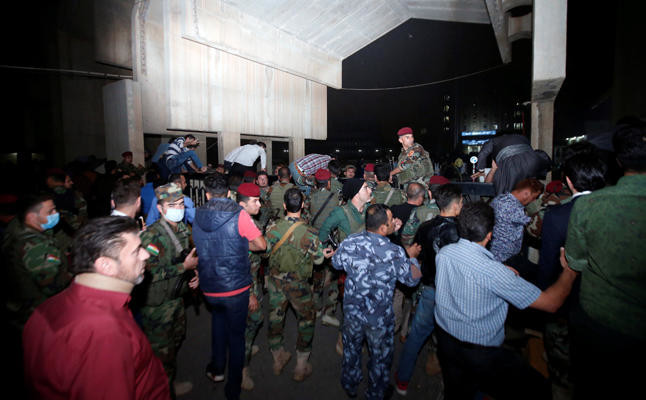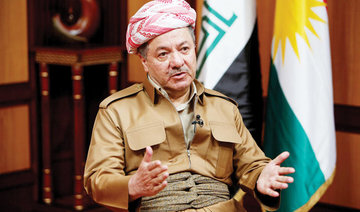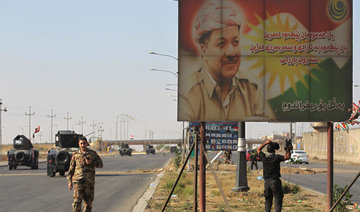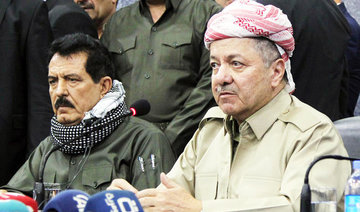IRBIL/BAGHDAD: Demonstrators angry at Masoud Barzani’s decision to step down as president of the Kurdistan Regional Government (KRG) stormed the regional parliament building in Irbil on Sunday as lawmakers met to act on the veteran leader’s resignation, witnesses said.
Barzani said he would give up his position as president on Nov. 1, after an independence referendum he championed backfired and triggered a regional crisis.
In a televised address, his first since Iraqi forces launched a surprise offensive to recapture Kurdish-held territory on Oct. 16, Barzani confirmed that he would not extend his presidential term after Nov. 1 “under any conditions.”
“I am the same Masoud Barzani, I am a Peshmerga (Kurdish fighter) and will continue to help my people in their struggle for independence,” said Barzani, who has campaigned for Kurdish self-determination for nearly four decades.
The address followed a letter he sent to parliament in which he asked members to take measures to fill the resulting power vacuum.
The region’s parliament met in the Kurdish capital Irbil on Sunday to discuss the letter. A majority of 70 Kurdish MPs voted to accept Barzani’s request and 23 opposed it, Kurdish TV channels Rudaw and Kurdistan 24 said.
Demonstrators, some carrying clubs and guns, stormed the parliament building as the session was in progress.
Gunshots were heard. Some protesters outside the building said they wanted to “punish” MPs who they said had “insulted” Barzani. Some attacked journalists at the scene.
Some MPs were barricaded in their offices on Sunday evening.
A Kurdish official had said on Saturday that Barzani had decided to hand over the presidency without waiting for elections that had been set for Nov. 1 but which have now been delayed by eight months.
The region, which had enjoyed unprecedented autonomy for years, has been in turmoil since the independence referendum a month ago prompted military and economic retaliation from Iraq’s central government in Baghdad.
'Always a peshmerga'
In his address, Barzani vigorously defended his decision to hold the Sept. 25 referendum, the results of which “can never be erased,” he said. The vote was overwhelmingly for independence and triggered the military action by the Baghdad government and threats from neighboring Turkey and Iran.
He added that the Iraqi attack on Kirkuk and other Kurdish held territory vindicated his position that Baghdad no longer believed in federalism and instead wanted to curtail Kurdish rights.
Iraq is using last month’s Kurdish independence referendum “as a pretext to attack Kurdistan,” news agencies quoted Barzani as saying.
The KRG agreed on Sunday to withdraw Kurdish forces from all disputed territories and hand over border crossings to Baghdad, federal and regional officials told Arab News. Baghdad responded to the referendum by launching a military campaign to regain control of disputed territories, including the northern city of Kirkuk and its lucrative oil fields.
The campaign achieved most of its objectives except for a few small areas. Federal forces are no more than a dozen kilometers from Irbil, the capital of Iraqi Kurdistan. Fierce fighting erupted in several places last week between advancing federal forces and Kurdish troops, with casualties on both sides.
Iraqi Prime Minister Haider Al-Abadi on Friday announced a 24-hour cease-fire, during which Baghdad’s demands must be met and Kurdish troops must withdraw from disputed territories.
“The Kurds have agreed to everything. Everything is solved,” a senior federal security official involved in the talks told Arab News.
KRG officials confirmed the deal and said it had immediately gone into effect. “An agreement was reached on handing over the disputed areas up to the borders of the region before the fall of (Saddam’s) regime,” Ghaith Al-Suraji, a senior Kurdish leader familiar with the talks, told Arab News.
“Meetings are continuing between the two sides in Mosul in order to agree on the mechanisms of handing over the areas.” The referendum and regional airports were not included in the talks, Al-Suraji said, adding: “The referendum is a political issue and this committee is a military one. Also, there are no airports in the disputed areas, so there were no discussions on that either.”
Ihssan Al-Shimari, an adviser to Al-Abadi, told Arab News: “Baghdad won’t back down or withdraw its request to cancel the result of the referendum.” Barzani, the architect of the referendum, urged Kurdish forces to meet soon to discuss filling “the political vacuum” created by his stepping down.
Barzani said he will “remain as a fighter within the Peshmerga (Kurdish forces),” and will “continue to struggle to win the rights of the Kurdish people and preserve their gains.”
US condemned
Barzani condemned the United States for failing to back the Kurds. “We tried to stop bloodshed but the Iraqi forces and Popular Mobilization Front (Shiite militias) kept advancing, using US weapons,” he said.
“Our people should now question, whether the US was aware of Iraq’s attack and why they did not prevent it.”
Barzani has been criticized by Kurdish opponents for the loss of the city of Kirkuk, oil-rich and considered by many Kurds to be their spiritual home.
His resignation could help facilitate a reconciliation between the Kurdistan Regional Government (KRG) and Iraq’s central government, whose retaliatory measures since the referendum have transformed the balance of power in the north.
Barzani has led the KRG since it was established in 2005. His second term expired in 2013 but was extended without elections being held as Daesh militants swept across vast swathes of territory in Iraq and Syria.
US-backed Iraqi government forces, Iranian-backed paramilitaries and Kurdish fighters fought alongside each other to defeat Islamic State but the alliance has faltered since the militants were largely defeated in the country.
After the Kurdish vote, Iraqi troops were ordered by the country’s prime minister Haider Al-Abadi to take control of areas claimed by both Baghdad and the KRG.
Abadi also wants to take control of the border crossings between the Kurdish region and Turkey, Iran and Syria, including one through which an oil export pipeline crosses into Turkey, carrying Iraqi and Kurdish crude oil.
The fall of Kirkuk — a multi-ethnic city which lies outside the KRG’s official boundaries — to Iraqi forces on Oct. 16 was a major symbolic and financial blow to the Kurds’ independence drive because it halved the region’s oil export revenue.
Iraqi forces and the Peshmerga started a second round of talks on Sunday to resolve a conflict over control of the Kurdistan region’s border crossings, Iraqi state TV said.
A first round was held on Friday and Saturday, with Abadi ordering a 24-hour suspension on Friday of military operations against Kurdish forces.
He demanded on Thursday that the Kurds declare their referendum void, rejecting the KRG offer to suspend its independence push to resolve a crisis through talks, saying in a statement: “We won’t accept anything but its cancelation and the respect of the constitution.”
(With Reuters and AFP)



















